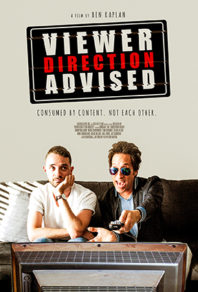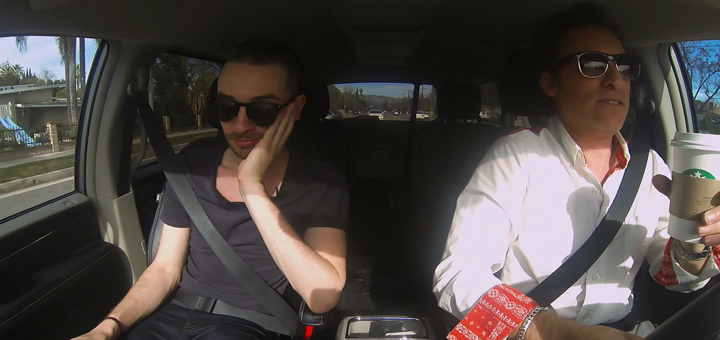
Full disclosure: I grew up with Ben Kaplan. The director and subject of the documentary Viewer Direction Advised lived not too far from me in our neighbourhood of Thornhill, attending the same Jewish day schools from elementary to high school. Though we ended up at different universities, we still kept in touch over the years. Kaplan currently works as an editor in Downtown Toronto, and I recently caught up with him to discuss his documentary.
MARC: What I really enjoy about your documentary is the father/son bonding throughout, just seeing you and your dad interact, it’s kind of the same way between me and my father. I’m wondering when you started to have the disconnect with your father, when did you realize that?
BEN: It’s funny, because I feel the more I get older, the more I’m realizing how similar we are, but it’s the personality that’s different. Like, I still love the same movies, I still like the same type of humour and TV shows, and I think that when I started to become my own person, I felt that he was a very extroverted personality and I’m very much introverted… I guess probably high school was when I saw that shift, and tried to figure out what I wanted to do and where I want to go, and then found my approach to it. Whereas he’s a lot bigger personality-wise, I’m more calculated and methodical, where I can do things at my own introverted pace, and extrovert myself when I need to. But we still definitely share that same love of humour, Television shows, and when I wanted more private time, my private time kinda coincided with the rise of streaming networks, and then I went out on my own to watch my own things when I want to, because now I have personal time to watch it.
MARC: So if anything, the rise of streaming didn’t gave you the freedom per se, but more of the chance for you to watch on your own time, because something you show in the documentary is just more how we have evolved from TV time watching as a family, to more fragmented “we’re all at our own pace” because there’s so much of it everywhere now:
BEN: I think due to, going to CHAT (Community Hebrew Academy of Toronto) as well, and having longer days than your average [high school or university student], or having a parents coming from work downtown, y’know it’s just these elements that are part of the recipe to not being able to watch stuff at the same time. It’s like “ok, you’re not home until an hour I get home anyways, so I’m going to watch without you regardless, and now that you’re home, I’m gonna be done watching those series, and I’m gonna watch another thing in my room because I’ve got my laptop to do that, and I want that private time, and I’m up until two in the morning now, and you’ve gone to bed at eleven.” So I feel that there’s a lot of little things that add into that recipe of fragmentation.

MARC: Have you ever been embarrassed by your dad because of the way he shows his love for his media?
BEN: Oh yeah, one hundred percent. There’s different elements, and you see in the film, like the whole scene where we saw Claire Daines at the airport, my dad wanted me to go meet her and get a picture with her. I feel like my dad’s obsession with his media is, due to his personality, very extroverted. If there’s something in his view that he loves, he wants me to do it right away, like singing the song at the Brady Bunch house. He wants me to do these things, whether it’s taking photos with celebrities, or whenever he sees someone in his realm of TV celebrities. He gets very “I gotta take a photo, I gotta talk, I gotta do this,” and for me, I don’t like that. I don’t like having that extroverted light shine on me, and so with his love of TV, he tries to bring others into that world, sometimes through my own embarrassment. And sometimes I will get a cool moment out of it, like when I was younger, he introduced me to Mickey Dolenz of The Monkees, which was kinda cool in hindsight, like I was nine years old and meeting Mickey Dolenz. Because my dad’s love of TV was thrusted upon us, when I was younger we would watch The Monkees, so for me it was like “oh it’s a celebrity” that I find out later… 30 years washed up, but that’s another issue. The embarrassment thing is definitely apparent with myself and my dad, and I feel like he forgets that his love of TV maybe isn’t my love of TV, or at least the shows he watches. So when he tries to get me in those moments, I don’t tend to care about that stuff.
MARC: Do you feel like your dad tends to live in the past, whereas you are trying to look more towards the future of stuff?
BEN: Yes and no. As much as he is nostalgic about those eras, and he loves those times, he still likes to keep up with new shows, he does watch new things that come out on Netflix. He just recently watched that Legend of Cocaine Island thing that just came out. I know it’s not a TV show but, he does look for these new interesting pieces to watch, and he does recommend them to me often, but the pop culture references in our house are abundant, constantly bringing up either Fantasy Island, The Brady Bunch or H.R. PufnStuf, fuck the list goes on and on to the point where he’s making me go out on eBay or Kijiji, and meet people downtown to buy television lunchboxes to decorate our house.
MARC: There’s this sequence early on in the basement of your house, where he’s just pouring through this giant collection, I’m putting that lightly, because the way that it’s framed is that he’s more of a hoarder. At what point do you really think that your father is not insane, but rather that he needs to slow this down? Is there a way you can slow him down?
BEN: No, but the way I can allow it is that I don’t see it. Because it’s in a basement, and it’s in a place that I don’t visit, it’s like “oh, you’re sane because I don’t see the madness.” So if I never have to open the door, then I have no reason to assume he’s crazy.
MARC: What do you want viewers to take away from this film, as you sum it up. Do you want it to be the father/son story, and seeing how our enjoyment of media has changed over time? The disconnects of enjoyments a father and son can have? I know that you’ve talked about the clashing personalities, but I feel like your film relates to how to form your own identity, or how parents shape what their children like, because I feel like I’m a product of what my parents like. I’m very much a person that’s an old soul, but likes contemporary stuff sometimes.
BEN: That’s funny, because I feel the same way as you. I even think about the tattoos I have, like the Airplane logo from the movie Airplane! and a Young Frankenstein tattoo, so the stuff I choose to decorate myself with is definitely old school compared to what I’m watching today. It’s a bit of a multi-takeaway, you can’t create the future without knowing the past. All these great shows that were on TV, you couldn’t have made those today if it weren’t for those shows of the past. All in the Family, Cosby Show, although we can’t talk about that anymore, you probably wouldn’t have a Breaking Bad, you probably wouldn’t have had a Batman, you probably wouldn’t have had an Atlanta or all these shows that we love now. If it weren’t for those shows that pushed boundaries, those wouldn’t exist. So on the one hand, as much as I think TV now is better, I do want the viewer to understand that TV now is built on the backs of these giants, and we have to learn from them and understand from them, which is why a lot of the interviews in the film are from hit shows of the 70’s and 80’s. At the end of the day, what I found with the film, was that no matter how good the television is that is out there and vice versa, it exists as a medium used to connect people in any way shape or form. We talk a lot about the fragmentation, everyone’s individualized, but even though we are individualized and our families have different times and schedules to watch what they want, when they want, different shows, you’re still gonna have to find a way to relate to another. In the grand scheme of life, TV is not the be all and end all, it’s one aspect of that connection. Sure, the communal thing that was there isn’t there anymore to the same extent, I don’t think necessarily the need to share and connect to people through that medium is dead, it’s just taking on different forms. Whether that’s through Facebook, Twitter, Reddit, text, or Game of Thrones viewing parties, etc. We’re going to adapt and find those needs to connect, TV can still have that power, just power in different ways.
This interview has been edited and condensed.

